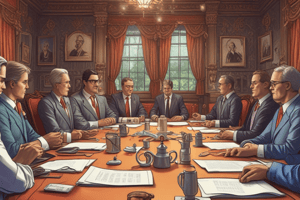Podcast
Questions and Answers
What sentiment did the author express regarding the widespread success of The Servant?
What sentiment did the author express regarding the widespread success of The Servant?
- Was surprised by its impact and sales (correct)
- Felt it was predictable from the start
- Believed it was an expected outcome
- Anticipated its success due to its unique ideas
What was one of the main reasons the author wrote The Servant?
What was one of the main reasons the author wrote The Servant?
- To sell millions of copies globally
- To provide advanced theories on leadership
- To frame common principles in an understandable way (correct)
- To challenge traditional business practices
Which theme did the author express concern about including in a business book?
Which theme did the author express concern about including in a business book?
- Team collaboration
- Leadership hierarchy
- Religious faith and love (correct)
- Profit maximization
What is indicated about the principles of servant leadership according to the author?
What is indicated about the principles of servant leadership according to the author?
What reaction did the author fear from publishers regarding the manuscript of The Servant?
What reaction did the author fear from publishers regarding the manuscript of The Servant?
What key themes are emphasized in the philosophy of servant leadership?
What key themes are emphasized in the philosophy of servant leadership?
How has the perception of leadership changed among millennials according to the content?
How has the perception of leadership changed among millennials according to the content?
What pivotal change occurred in Brazil regarding servant leadership after the publication of The Servant?
What pivotal change occurred in Brazil regarding servant leadership after the publication of The Servant?
What does the phrase 'the airline that love built' refer to in the context of servant leadership?
What does the phrase 'the airline that love built' refer to in the context of servant leadership?
Which iconic leaders are mentioned as advocates of love in leadership?
Which iconic leaders are mentioned as advocates of love in leadership?
What was a surprising outcome for the author after publishing The Servant?
What was a surprising outcome for the author after publishing The Servant?
What is the essential rule regarding leadership mentioned by the author during lectures?
What is the essential rule regarding leadership mentioned by the author during lectures?
What is the primary essence of leadership according to the content?
What is the primary essence of leadership according to the content?
How does the content differentiate between management and leadership?
How does the content differentiate between management and leadership?
According to the content, what should a leader primarily focus on when interacting with others?
According to the content, what should a leader primarily focus on when interacting with others?
Which of the following is NOT a characteristic of a great leader mentioned in the content?
Which of the following is NOT a characteristic of a great leader mentioned in the content?
What is described as the final test of effective leadership?
What is described as the final test of effective leadership?
In servant leadership, the leader's role is to meet which type of needs?
In servant leadership, the leader's role is to meet which type of needs?
What misconception about leadership is highlighted in the content?
What misconception about leadership is highlighted in the content?
Which statement best describes the relationship between wants and needs?
Which statement best describes the relationship between wants and needs?
What common question do effective organizations no longer ask regarding leadership?
What common question do effective organizations no longer ask regarding leadership?
What is the primary essence of leadership as described in the Law of the Harvest?
What is the primary essence of leadership as described in the Law of the Harvest?
What two qualities did Jim Collins identify in great leaders?
What two qualities did Jim Collins identify in great leaders?
Why did Collins' team avoid using the term 'servant leaders'?
Why did Collins' team avoid using the term 'servant leaders'?
What does the author suggest about organizational spending on leadership training?
What does the author suggest about organizational spending on leadership training?
In terms of leadership, what is difficult according to the content?
In terms of leadership, what is difficult according to the content?
How does the author compare learning leadership to acquiring a skill?
How does the author compare learning leadership to acquiring a skill?
Which of the following is NOT included in the traditional definition of love as described in the content?
Which of the following is NOT included in the traditional definition of love as described in the content?
What barrier does the author mention when discussing the term 'servant'?
What barrier does the author mention when discussing the term 'servant'?
What overarching message about leadership is conveyed through the comparisons made in the content?
What overarching message about leadership is conveyed through the comparisons made in the content?
Flashcards
Servant leadership principles
Servant leadership principles
Basic, common-sense ideas about leading others through service and care, not self-interest.
International best-seller
International best-seller
A book that has enjoyed wide success and has been bought by many people across the world.
Risk of discussing 'namby-pamby' or controversial themes in business books
Risk of discussing 'namby-pamby' or controversial themes in business books
Discussing themes like faith, selflessness, and love could be seen as inappropriate or unprofitable in the business world; potentially alienating readers.
Self-employed labor relations consultant
Self-employed labor relations consultant
Signup and view all the flashcards
Author's initial expectation of the book
Author's initial expectation of the book
Signup and view all the flashcards
Servant Leadership
Servant Leadership
Signup and view all the flashcards
Old-fashioned leadership
Old-fashioned leadership
Signup and view all the flashcards
Millennials
Millennials
Signup and view all the flashcards
Why servant leadership is gaining popularity
Why servant leadership is gaining popularity
Signup and view all the flashcards
Global shift towards servant leadership
Global shift towards servant leadership
Signup and view all the flashcards
Impact of The Servant book in Brazil
Impact of The Servant book in Brazil
Signup and view all the flashcards
The Golden Rule
The Golden Rule
Signup and view all the flashcards
Leadership vs. Management
Leadership vs. Management
Signup and view all the flashcards
Influence: The Core of Leadership
Influence: The Core of Leadership
Signup and view all the flashcards
What's the final test of leadership?
What's the final test of leadership?
Signup and view all the flashcards
Servant Leadership: The Key Difference
Servant Leadership: The Key Difference
Signup and view all the flashcards
Needs vs. Wants: The Servant's Insight
Needs vs. Wants: The Servant's Insight
Signup and view all the flashcards
The Essence of Servant Leadership
The Essence of Servant Leadership
Signup and view all the flashcards
Examples of Needs
Examples of Needs
Signup and view all the flashcards
Leaders in Every Role
Leaders in Every Role
Signup and view all the flashcards
The Great Organizations
The Great Organizations
Signup and view all the flashcards
Law of the Harvest
Law of the Harvest
Signup and view all the flashcards
Level 5 Leader
Level 5 Leader
Signup and view all the flashcards
Hugging and Spanking
Hugging and Spanking
Signup and view all the flashcards
Servant Leadership: A Skill
Servant Leadership: A Skill
Signup and view all the flashcards
The Servant: Leadership, Character, Love?
The Servant: Leadership, Character, Love?
Signup and view all the flashcards
Love: A Verb
Love: A Verb
Signup and view all the flashcards
Leadership is NOT Innate
Leadership is NOT Innate
Signup and view all the flashcards
Effective Leadership Training
Effective Leadership Training
Signup and view all the flashcards
Waste of Time and Money?
Waste of Time and Money?
Signup and view all the flashcards
Study Notes
Introduction to the 2012 Edition
- Author's initial surprise and humility about the book's success (over 3.5 million copies sold internationally).
- Principles of servant leadership are basic and self-evident.
- Author found a unique framing to easily convey these principles.
- Prior to writing the book, the author was a labor relations consultant in Southeast Michigan.
- Author hesitated to address "politically incorrect" topics like faith, selflessness, humility, and even love within a business context.
- The author chose to include these themes because intellectual honesty about servant leadership requires them, referencing historical leaders (Jesus, Gandhi, Mother Teresa, Martin Luther King Jr., Vince Lombardi, John Wooden, Jack Welch, Max De Pree, Herb Kelleher) who embodied these values.
- Herb Kelleher's Southwest Airlines used the advertising motto "The airline that love built." Southwest's stock ticker symbol is "LUV."
- Book's fast completion (six weeks) compared to the author's other books.
- Author's initial expectation that the primary audience would be faith-based organizations.
- The author's experience was that the primary audience was secular.
The World is Changing—Fast
- The concepts of servant leadership have gained acceptance in American business circles since the early 1970s, growing significantly in the following fifteen years
- Amazon.com search results for "servant leadership" increased from 8 to 4,600 titles between 1998 and the present.
- Younger generations (millennials) are less responsive to traditional command-and-control leadership styles.
- A common finding in polls is when more than 70 percent of millennials who voluntarily terminated their employment quit their boss, not the organization.
- The rebellion against bad leadership is not limited to the US but spans globally.
- Examples include uprisings in Russia, Africa, and the "Arab Spring" in the Middle East.
- Case study of Brazil's recent economic transformation and the success of "The Servant" in the country (translated to "O Monge E O Executive").
- "The Servant" (O Monge E O Executive) has sold roughly 3 million copies in Brazil since its release. Its author's second book on servant leadership has sold 500,000 copies.
Servant Leadership Is Simple
- Leadership is simple; it boils down to treating others as you want to be treated (The Golden Rule).
- Leadership is about being the boss you wish you had.
- Teaching leadership principles to children is easier because of their simplicity.
Leadership Is Influence
- Leadership is not synonymous with management.
- Management entails tasks like planning, budgeting, and organizing.
- Leadership is about inspiring and influencing people towards action.
- Examples of influential leaders (Winston Churchill, Ronald Reagan), although not exemplary managers.
- Leadership is influence and the impact you have on others, not the tasks you perform.
- Several leadership experts (Ken Blanchard, John Maxwell) define leadership as an influence process.
- Great organizations are comprised of effective leaders who influence one another.
What Is a Servant?
- Being a servant is about meeting the legitimate needs of those you lead.
- Distinction between needs and wants must be made.
- Needs are essential physical and psychological requirements.
- Examples of needs include appreciation, respect, communication, and encouragement. Accountability, boundaries, rules, consistency, and honesty are crucial. Feedback is needed, too.
- Meeting the needs of others builds influence.
In 2001, author Jim Collins published Good to Great, one of the highest selling hard cover business books of all time and provided empirical evidence for servant leadership
- Collins researched the best organizations and found that their leaders possessed humility and strong professional willpower.
- Collins initially hesitated to use the term "servant leader".
Leadership Is Not About Style or Personality
- Great leaders from history demonstrate varying leadership styles, yet achieving similar success (John Wooden, Bobby Knight, General Patton, General Eisenhower, Martin Luther King Jr., Billy Graham, Jack Welch, Mary Kay, Abraham Lincoln, Ronald Reagan).
- Leaders' personalities are formed early in life: personality and IQ are fixed by age 6 and 15 respectively.
- Character, however, evolves over time, and is vital in leadership; 99% of leadership failures are character related
What is Character?
- Character is who you are when no one is watching.
- Character is about doing the right thing, even when difficult.
- Character is about moral maturity and doing the right thing in difficult circumstances.
- Leadership is character in action.
- Improving leadership requires improving character.
Developing Character
- Continuous improvement is essential for leadership development.
- Habits, both good and bad, develop through several stages.
- The four stages include unconscious/unskilled, conscious/unskilled, conscious/skilled, and unconscious/skilled.
Three Steps to Developing Character/Leadership Skills
- The Three Fs: Foundation, Feedback, and Friction.
- Foundation: Establish standards of great leadership and committed principles.
- Feedback: Recognize and identify gaps between current performance and desired standards. Ask others for feedback; using 360-degree feedback tools is useful.
- Friction: Set measurable goals to address feedback-identified gaps; forcing open dialogue about leadership development.
Summary and Conclusion
- The success of "The Servant" stems from a universal human need for better leaders and leadership development.
- Servant leadership, though centuries old, is relevant in modern times.
- While its principles are easily accepted, becoming an effective servant leader necessitates commitment, discipline, and changes in habits.
Studying That Suits You
Use AI to generate personalized quizzes and flashcards to suit your learning preferences.
Description
Explore the foundational themes and success of the 2012 edition on servant leadership. Delve into the author's insights on humility, selflessness, and love in business, along with historical examples of influential leaders. This quiz will challenge your understanding of these principles and their relevance today.





